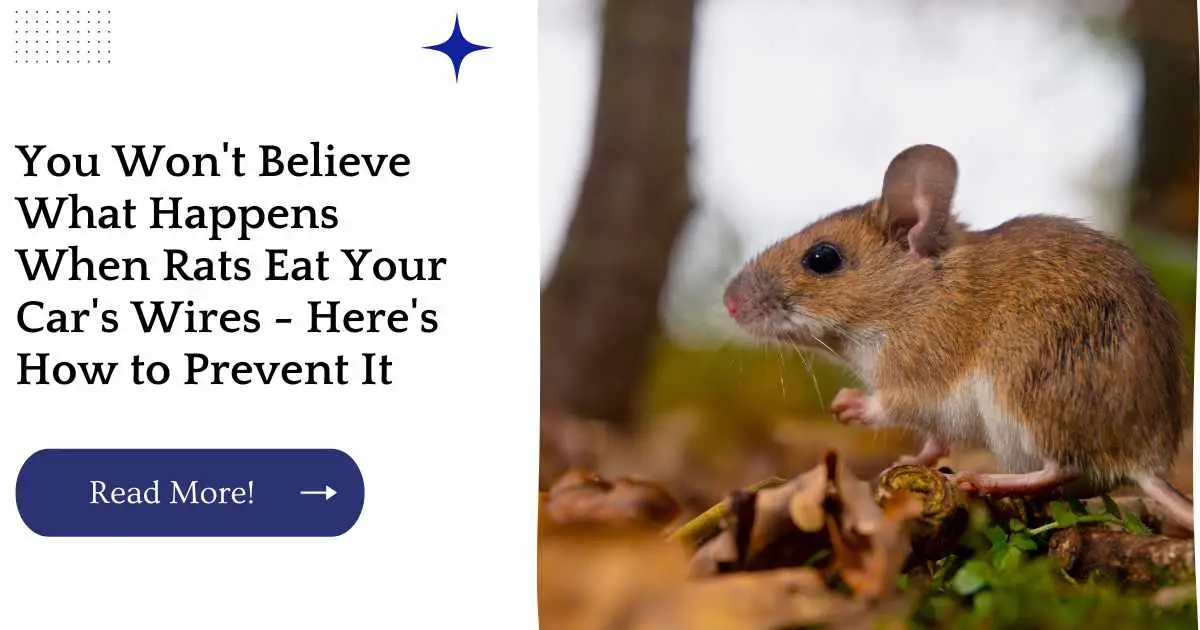Cars are expensive, and it’s not fun to discover that your car has been damaged by rats. Rats can chew through wires inside your car’s engine or other electrical components, causing them to short out.
If this happens, you’ll need to replace the part(s) that were chewed on before they cause further damage. Here are some ways you can prevent this from happening in the first place:
| Takeaways |
|---|
| Protecting your car from rats is important to avoid expensive damages. |
| Rats have a tendency to chew car wires, leading to engine problems and electrical failures. |
| Rat infestations can be prevented by keeping your car clean, parking it in well-lit areas, and using rodent repellant devices. |
| If you suspect your car has been damaged by rats, take it to a mechanic right away for inspection and repair. |
| Resources such as guides, blogs and service pages can be a useful source of information on how to prevent and stop rats from chewing on car wires. |
Your Car Really Won’t Start
So, the car won’t start. You turn the key and nothing. Then, you check your battery and find that it’s dead. You try jumping it with another vehicle, but even that doesn’t work! What could have caused this?
Rats love to nest in engines. They’re warm, cozy places for them to hide out during winter months or when they’re just trying to get away from predators (like cats).
They also like spending time there because they can stash their food nearby so they don’t have to leave their comfortable spot as often. And finally, rats are excellent chewers if a rat is chewing on a wire inside your engine block, that may be why your car won’t start!
Preventing rats from destroying your vehicle is easy with a few simple steps. Follow our guide on detering rats from your vehicle to protect your car and avoid costly repairs
Your Air Conditioning Fails
It’s time to get out your toolbox and start checking on the wiring in your car. If you spot rat damage, notify a mechanic right away.
They can fix the problem by replacing the damaged wiring with new wires, which are expensive but necessary to ensure that your air conditioning system stays strong.
Your air conditioning system is vital when you’re driving during hot weather. If rats have been chewing through those wires, you need to make sure there aren’t any other problems with them before turning on the A/C for good it could cause an electrical fire or even cause carbon monoxide to leak into the vehicle!
Air Conditioning Failure
| Cause | Possible Solution |
|---|---|
| Dirty air filters | Clean or replace air filters |
| Refrigerant leaks | Repair or replace refrigerant lines |
| Electrical issues | Check and replace faulty electrical components |
| Clogged drain lines | Clean and unclog drain lines |
| Faulty compressor | Replace compressor unit |
| Frozen evaporator coil | Defrost evaporator coil |
| Overused AC unit | Schedule regular maintenance and tune-ups |
Your Headlights Go Dim or Off
One of the most common ways that rats can cause damage to your car is by nesting in it. In many cases, they’ll make nests in the engine compartment or under the hood. Unfortunately, this means that they have access to some very important components on your car—like headlights!
When rats eat through wiring and electrical connectors, it can cause problems with your headlights.
The lights might not come on at all, or they might flicker intermittently at low speeds (or when you’re going over bumps).
Water damage from rain leaking into hose-connectors and electrical boxes can also cause problems with these parts of your vehicle and may result in dimming headlights as well as other issues such as overheating engines – all of which are dangerous situations for drivers!
Rats chewing on your car wires can cause serious damage and be a real headache. Stop them in their tracks with our helpful tips on how to stop rats from chewing wires and ensure your car stays in top condition
Electrical Components Fail or Acting Oddly
Rats are known for chewing on wires, which can cause direct damage to the wiring. This may result in an electrical system that fails to work properly. In some cases, rats might also chew through the insulation on cables or other components and expose them to moisture or other elements that could cause corrosion and damage.
For example, if a rat chews through an electrical wire connected to your car’s battery, it could result in a dead battery that needs replacement.
Your Battery Runs Out of Juice
If you’ve noticed your battery draining faster than normal, it could be because of a rat problem. Your car may not start as easily and might take longer to charge up, too. Rats can also chew on wires in the engine compartment and cause your battery to die completely.
If you see rats or signs that they’ve been around, clear them out as soon as possible so this doesn’t happen!
Protecting your car from rat damage is important for its longevity and value. Our ultimate guide to protecting your car from rats will provide you with all the information you need to secure your vehicle and prevent rats from causing harm
Your Power Steering Stops Working Right
Some people don’t realize that the power steering system in a car is actually a belt-and-pulley setup.
Each time you turn the steering wheel, it’s not your muscles doing the work; instead, energy from the engine goes through a series of pulleys (called “power steering pumps”) to move fluid around in your vehicle.
When rats eat wires or other parts of your car’s electrical system, they can cause electrical problems that mess with your power steering pump and make turning difficult. As long as you have working brakes and an intact braking system on any vehicle, this isn’t usually dangerous but it can be annoying and lead to costly repairs over time if left untreated!
To prevent this from happening, keep food sources away from your vehicle: not just food left in open bags but also uneaten groceries like apples or oranges on grocery store shelves (rats love these!).
Keep garbage cans out of sight (this is particularly important if there are cats nearby). Clear brush around garages so there are no hiding places for rodents near where cars are parked overnight; often times one rat will bring along friends who want dinner too!
Don’t let rats invade your car and cause irreversible damage. Learn the best ways to prevent rat invasions with Unified Shields to keep your car safe and protect your investment.
Your Car’s Computer Is Damaged
If you’re a fan of your car’s computer, you’ll want to do everything in your power to protect it. To do this, car owners should make sure that rats won’t get into their vehicles.
This can be done by keeping food in sealed containers and not leaving trash on the floor of their vehicle.
Once a rat has gotten into an engine compartment or other area where wiring is located, there are several things that can happen:
- The rat may chew through a wire completely and cause the entire system to fail;
- The rat may chew through several wires which will cause different parts of your electrical system not to work properly; or
- The rat might simply leave some droppings behind which will damage equipment over time as moisture builds up from the urine and feces left behind.
Remove Rat Nests, Keep Your Garage Door Shut, And Read This Article To Get The Full List
Rats are known to chew through wires and cables, causing a lot of problems in your car. Here is how you can prevent rats from doing this:
Remove any rat nests that may be near the garage door. Rats prefer to make their homes close to food sources, so if there is a nest near your garage door, it will most likely be full of food waste and other things that rats like to eat.
Keep your garage door closed at night time or whenever you’re not using it. If your garage has vents leading outside, then these need to be plugged up with a rubber stopper or something else that will keep pests out.
You’ll also want to check for holes around the frame of the garage door every now and again so that pests don’t get inside in between repairs being made on them (which is why we suggest checking every now and again rather than checking once).
Rats can quickly wreak havoc on your car’s wires and electronics, but there are many surprising tips to prevent them from causing harm. Take a look at our surprising tips for keeping rats away from your car and protect your car from costly repairs.
Conclusion
We hope this article has helped you understand some of the ways rats can damage your car. If you’re concerned about rats in your garage or around your home, we recommend taking action to remove them.
You can also read our full article on how to prevent rats from eating your car’s wires and causing other problems.
Further Reading
How to protect your car from rodents: A comprehensive guide from Consumer Reports on how to prevent rodents from entering and damaging your car.
How to prevent rats from eating car wires: A blog post featuring tips and advice on how to prevent rats from chewing on your car wires.
Stop Rodents from Chewing Car Wires: A service page by Capistrano Toyota on how to stop rodents from chewing on car wires.
FAQs
What kind of damage can rats cause to my car?
Rats can cause significant damage to your car’s wiring system, which can lead to various issues such as engine problems, electrical failures, and even fires.
Why do rats chew on car wires?
Rats love to chew on things as a way to keep their teeth length at bay. Car wires have a rubber-like consistency that rats seem to enjoy chewing on.
How do I know if my car has been damaged by rats?
If you notice wires that have been chewed and have visible teeth marks, or if your car is showing signs of electrical or mechanical problems, take it to a mechanic to get it inspected for rodent damage.
How can I prevent rats from entering my car?
You can prevent rats from entering your car by keeping it clean, parking it in well-lit areas, and using rodent repellant devices.
What do I do if my car has been damaged by rats?
If your car has been damaged by rats, your best course of action is to take it to a mechanic to get it inspected and repaired. It’s not recommended to try to fix the damage yourself as it can be hazardous and may cause further damage to the car.

Hello! I’m Hellen James, and I write about how to keep pests from invading your home. For the last 10 years, I’ve been working in pest control and am excited to share my expertise with you!


